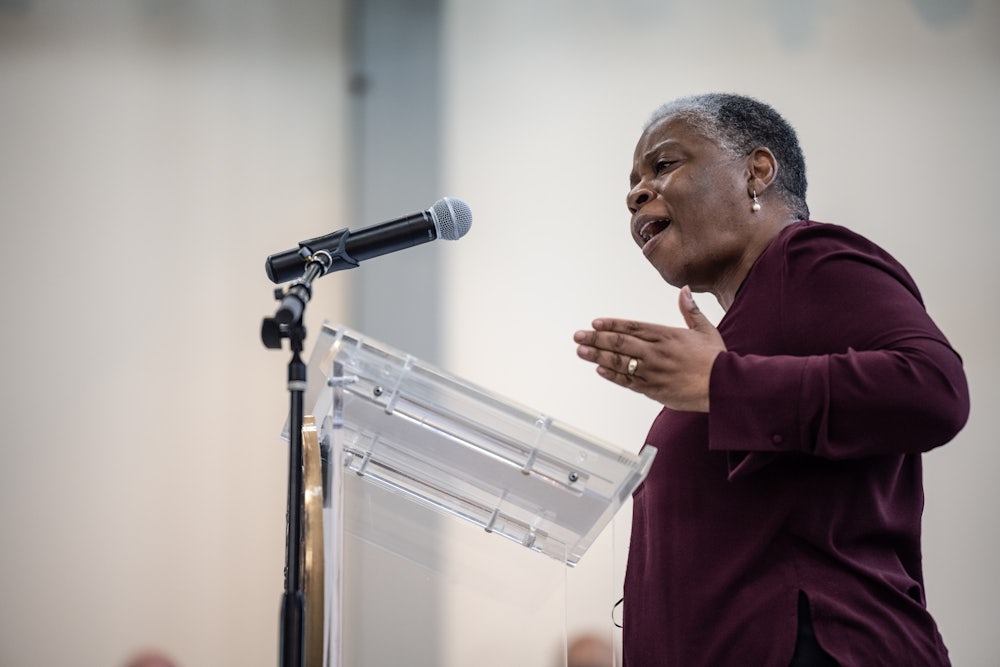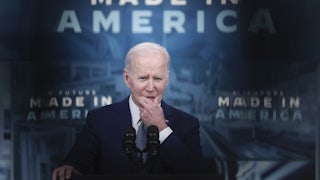Kentucky, Mississippi, and Louisiana may not seem to be obvious opportunities for Democrats to win major statewide races. But a new memo from the Democratic Attorneys General Association, first obtained by The New Republic, argues that the upcoming elections in these three states are not only competitive but winnable for Democrats.
“Sitting 100 days out from Election Day, November 7, 2023, the environment is primed for the three Democratic Attorneys General candidates to compete this year,” the memo says, adding that the association “intends” to pick up at least one seat among the three. Kentucky, which currently has a popular Democratic governor, and Mississippi both have “a long history of electing Democratic Attorneys General,” the memo notes; the attorneys general in both states are the first Republicans elected to that office in decades.
The memo attempts to flip the conventional wisdom that Republicans are stronger on issues of public safety than Democrats, contending that GOP candidates and incumbents are “more focused on advancing Washington Republicans’ extremist agenda than keeping their constituents safe.” The memo also highlights abortion as a key issue, after the Supreme Court decision overturning Roe v. Wade helped motivate voters in the 2022 midterm elections.
“In all three 2023 states, voters are focused on public safety, freedom, and tackling corruption, three areas that the sitting Republican AGs and nominees alike have failed their constituents,” the memo says.
Kentucky
The Democratic candidate for attorney general in Kentucky is Pam Stevenson, a state representative and retired Air Force colonel. Her experience in the military and as an ordained minister provide “a key element to communicate with independent and right-leaning voters,” the memo argues. It contrasts her with Republican candidate Russell Coleman, a former U.S. attorney appointed by President Donald Trump who also once served as counsel to Senate Majority Leader Mitch McConnell, a kingmaker in the Bluegrass State. The memo slams Coleman as a “consummate political insider” who is “pushing the extremist, national Republican agenda,” highlighting his support for the state’s near-total abortion ban and an amendment rejected by voters last year that would have explicitly denied the state a constitutional right to an abortion. (Coleman has been endorsed by groups that oppose abortion rights, such as Susan B. Anthony Pro-Life America.)
The memo cites internal polling showing that, while both candidates are largely unknown, “Stevenson’s biography connects more strongly with Kentucky voters than Coleman’s.” The memo continues: “After hearing positives on both candidates, Colonel Stevenson took a slight lead over Coleman, 44-43.”
Stevenson may also have her campaign buoyed by Governor Andy Beshear’s presence on the ballot. Beshear is facing a challenge from Republican Daniel Cameron, the current attorney general. As the memo notes, Beshear is the most popular Democratic governor in the country; a recent poll by Morning Consult found that Beshear has a 64 percent approval rating among all Kentucky voters, his highest since President Biden took office. Moreover, Beshear has support from 49 percent of Republicans, a stronger approval rating among GOP voters than any other Democratic governor. The Cook Political Report rates the Kentucky governor’s race as “lean Democratic.”
The DAGA memo notes that some Republican polling shows Beshear leading Cameron. These polls “indicate Governor Beshear’s cross-party appeal, an appeal that DAGA’s own polling and focus groups show that Colonel Stevenson shares thanks to her military experience and faith.” As 31 percent of voters are undecided on the attorney general race, the memo says, Stevenson has the opportunity to pick up persuadable voters.
However, campaign finance reports show that Coleman may have a financial advantage over Stevenson going into the general election. According to the Kentucky Registry of Election Finance website, Coleman transferred nearly $580,000 to his general election campaign to close out his primary account. Stevenson had a balance of around $75,000 at the end of her primary campaign but has yet to transfer it to a general election account.
Mississippi
The Democratic candidate for attorney general in Mississippi is Greta Kemp Martin, the litigation director for Disability Rights Mississippi. Given the potency of abortion in modern electoral politics, the memo describes incumbent Republican Attorney General Lynn Fitch as “the woman behind the Dobbs decision.” Fitch, the first woman to hold the position of attorney general in the state, filed the brief to the Supreme Court for Dobbs v. Jackson Women’s Health Organization, which resulted in the court overturning the federal right to an abortion.
“Kemp Martin’s campaign has highlighted the way the Dobbs decision has negatively impacted Mississippi as a whole, beyond just reproductive rights,” the memo says, giving the example of “health care deserts” in the state. (Several counties in Mississippi have no hospitals providing obstetric care, no ob-gyns, and no nurse midwives, according to Mississippi Today.) The memo also cites a June Mississippi Today/Siena College poll, which found that 45 percent of Republican voters support repealing the near-total ban on abortion in the state; however, that same poll also showed 44 percent oppose repealing the ban.
Views on abortion in the state are complicated: Pew Research finds that 59 percent of adults in Mississippi believe abortion should be illegal in all or most cases, but a 2022 poll by the American Civil Liberties Union of Mississippi found that 51 percent of Mississippians oppose the Dobbs decision. In 2011, Mississippi voters overwhelmingly rejected a “personhood” amendment that would have defined life as beginning at conception.
However, Mississippi is still largely conservative, and Fitch is considered by many Republicans in the state to be somewhat of a rising star. She easily won her first election, earning nearly 60 percent of the vote in 2019. It’s unclear whether the Democratic criticisms of Fitch, such as her paying out-of-state firms to defend Mississippi laws restricting abortion and her response to the state’s public welfare scandal, would stick to Fitch in a general election.
The memo notes that Fitch was the first Republican elected to the position since Reconstruction, and only the second GOP attorney general since 1818. But the Cook Political Report rates the governor’s race as “likely Republican,” and polling has shown Democratic gubernatorial candidate Brandon Presley—although relatively popular among GOP voters—lacks widespread name recognition.
If Kemp Martin succeeds in November, it may be in part a testament to the staying power of abortion as a major electoral issue. “Protecting personal freedoms is a winning message, and Kemp Martin has made it a cornerstone of her campaign as she travels the state with plans to turn out voters in urban and suburban areas,” the memo says.
Louisiana
The greatest challenge may be in Louisiana, where Democrats have not yet fielded a candidate for attorney general, but the memo says that “DAGA is working closely to have a competitive Democratic challenger enter the race.” The memo also argues that the state’s jungle primary “provides a unique opportunity for Democrats.” All candidates will compete in an October 14 primary, and if no one receives more than 50 percent of the vote, the race continues to a runoff general election between the top two candidates on November 18.
There is recent evidence that Democrats can win statewide in Louisiana: Current Governor John Bel Edwards won in an upset in 2015 and was reelected in 2019. However, Edwards is term-limited. As state Attorney General Jeff Landry is now running for governor as a Republican, his seat is open.
“This setup is similar to the 2015 election, when Bel Edwards capitalized on an extremely divisive Republican primary and a wounded gubernatorial nominee to score a massive upset victory,” the memo says. An independent candidate who was expected to garner significant support from Democratic voters dropped out last month, paving the way for a Democratic candidate to step in. The memo contends that the presence of two Republican candidates would also make way for a “strong Democratic contender” who is “expected” to launch a campaign before the August 10 filing deadline.
“Once a Democrat enters the race, there is a path forward thanks to Republican in-fighting and Democratic strength coalescing up and down the ticket,” the memo says.
Still, the eventual Democratic candidate would need to raise serious money in a short period of time to be competitive, as the two Republican candidates have pulled in significant funds this year. It’s also unclear how much help this candidate would get from the top of the ballot. Shawn Wilson, the former head of the Transportation Department, is running for governor as a Democrat, but most polling in the race shows Landry in the lead. The Cook Political Report also rates the governor’s race as “lean Republican.”
Winning any of these three races will be challenging. In 2020, Trump won all three states with around 60 percent of the vote. In 2019, when Beshear won the governorship by roughly 5,000 votes, Cameron glided to victory against the Democratic candidate for attorney general. Landry won his 2019 race in Louisiana with 66 percent of the vote.
But the memo expresses confidence in their 2023 prospects, highlighting the strategy for winning difficult states: Emphasize their candidates’ own backgrounds, hammer Republicans on their connection to national GOP politics, and be vocal about abortion rights. As Democratic attorney general candidates did better than expected in 2022, flipping seats in Arizona and Wisconsin and defending all incumbents who won in 2018, the DAGA is bullish about their candidates’ prospects this year. (Republicans did gain the seat in Iowa in 2022, but that losing Democratic incumbent had been first elected in 1994.)
“The Democratic candidates have strong records of public service, have a plan to make their states safer, and are aggressively taking on Republicans on rights and personal freedom,” the memo says.






